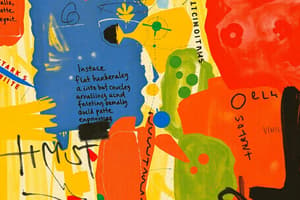Podcast
Questions and Answers
What was Christopher Columbus's main goal in 1492?
What was Christopher Columbus's main goal in 1492?
- To spread Christianity
- To find a new route to Asia (correct)
- To explore the Atlantic Ocean
- To prove the world was round
What was the result of Christopher Columbus's treatment of the Taino people on Hispaniola?
What was the result of Christopher Columbus's treatment of the Taino people on Hispaniola?
- They were assimilated into European culture
- They became loyal subjects of the Spanish monarch
- They were forced into slavery and many died from torture and infectious diseases (correct)
- They were treated as allies and trading partners
What is the difference between a fact and an opinion?
What is the difference between a fact and an opinion?
- A fact is a historical event, while an opinion is a scientific theory
- A fact is a personal view, while an opinion is a proven truth
- A fact is an exact and specific thing, while an opinion is a view or feeling (correct)
- A fact is a myth, while an opinion is a legend
What is a primary source of information?
What is a primary source of information?
What was the main goal of John A. MacDonald's National Policy?
What was the main goal of John A. MacDonald's National Policy?
What was Clifford Sifton's role in Canadian history?
What was Clifford Sifton's role in Canadian history?
What was the WASP model?
What was the WASP model?
What was one of the ways that John A. MacDonald's National Policy aimed to settle the west?
What was one of the ways that John A. MacDonald's National Policy aimed to settle the west?
What is one of the challenges to studying history?
What is one of the challenges to studying history?
What is fragmentation in the context of studying history?
What is fragmentation in the context of studying history?
What is bias in the context of history?
What is bias in the context of history?
What is an example of bias in history?
What is an example of bias in history?
Who is believed to be the first European to reach North America?
Who is believed to be the first European to reach North America?
What is a consequence of distortion in history?
What is a consequence of distortion in history?
Flashcards are hidden until you start studying
Study Notes
Challenges to Studying History
- Perception: how we see things is specific to our view, and no two people will see the same situation in the same way, making it harder to study history.
- Distortion: when senses are fooled, and we are made to believe something that may not be true or real, making it harder to track timelines and gain information on events.
- Fragmentation: limited information can lead to false ideas on events that occurred, especially in the past.
Bias in History
- Bias: prejudice in favor or against one thing, person, or group compared with another in a way that is unfair.
- Examples of bias:
- Older generations have bias towards newer traditions and customs.
- Political party bias.
- Society's bias towards people who are more conventionally attractive.
The Real Christopher Columbus
- Columbus never set foot on North American shores or unfurled the Spanish flag there; he landed on the Bahamas shores.
- Millions of people had already been living in North America, and Leif Eriksson was the first European there, nearly 5 centuries ago.
- Columbus had a contract with the Spanish monarch, naming him the admiral, viceroy, and governor of any land he found.
- He forced the natives on Hispaniola, the Taino, into slavery and punished them with the loss of limb or death.
- The Taino population was essentially killed off by the torture and infectious diseases brought by Europeans.
- Columbus was arrested by Spanish monarchs when they found out about his mistreatment and was stripped of his governor title.
Fact vs. Opinion
- Facts: exact and specific things that happened that can be proved to be true again and again.
- Opinions: views, impressions, or feelings that are not exact and can't be fully proved.
Primary vs. Secondary Sources
- Primary source: a direct source of information about an event, person, or thing (e.g., trench letter).
- Secondary source: an indirect source of information about an event, person, or thing (e.g., history textbook).
Canadian Origins
National Policy of John A. MacDonald
- Way to unify the nation and solidify Canada as a place on the continent.
- Complete railroad to link Toronto to the west coast – was promised to BC for joining.
- Use railway to settle the west and encourage immigration.
- Put in taxes and tariffs to protect Canada's young businesses.
Clifford Sifton
- Minister of the Interior under Laurier.
- In charge of enticing people to come to western Canada.
WASP Model
- White Anglo-Saxon Protestants.
Studying That Suits You
Use AI to generate personalized quizzes and flashcards to suit your learning preferences.




